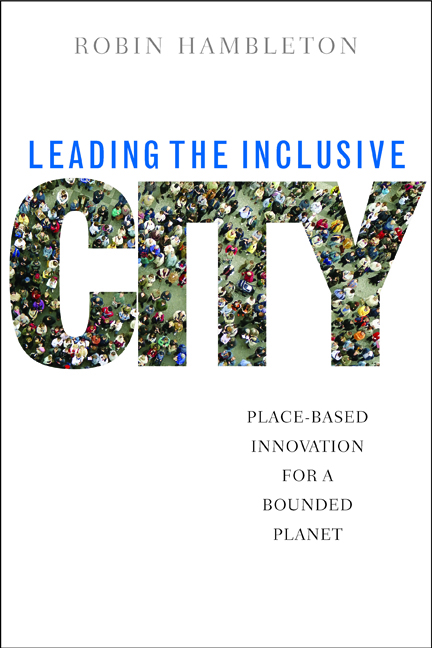Book contents
- Frontmatter
- Dedication
- Contents
- List of figures
- List of innovation stories
- About the author
- Preface
- A guide to the book
- Overview
- Part 1 Diagnosis: Understanding trends and challenges
- Part 2 Concepts: Place, leadership, innovation and democratic governance
- Part 3 Experiences: Place-based leadership in action
- Part 4 Lesson drawing: Insights and international learning
- Notes
- Appendix: International city networks and resources
- Acknowledgements
- References
- Index
Twelve - International lesson drawing
Published online by Cambridge University Press: 08 March 2022
- Frontmatter
- Dedication
- Contents
- List of figures
- List of innovation stories
- About the author
- Preface
- A guide to the book
- Overview
- Part 1 Diagnosis: Understanding trends and challenges
- Part 2 Concepts: Place, leadership, innovation and democratic governance
- Part 3 Experiences: Place-based leadership in action
- Part 4 Lesson drawing: Insights and international learning
- Notes
- Appendix: International city networks and resources
- Acknowledgements
- References
- Index
Summary
We don't want nobody nobody sent.
Chicago Ward Committeeman to Abner J. Mikva, 1948
Introduction
I am British so it was a steep, cross-cultural learning curve for me when I was appointed as Dean of the College of Urban Planning and Public Affairs at the University of Illinois at Chicago (UIC) in 2002. Luckily I had great colleagues – faculty, staff and students – who helped me learn a little, certainly not enough, about American higher education in general, and Chicago politics in particular. Very early on I struggled with Abner Mikva's famous account of the reaction he received when he tried, as a student, to volunteer to help with local political activity in Chicago. He was told: ‘We don't want nobody nobody sent’. For a start, I did not understand what it meant.
I needed a lesson in Illinois history and UIC colleagues were generous in their assistance. Abner Mikva, who was later to become a senior adviser to President Obama, studied at the Chicago Law School in the late 1940s. He was already an enthusiastic Democrat supporter when, walking home one night in 1948, he dropped into the ward headquarters of the Democratic Party and said: ‘I’d like to volunteer to work for Adlai Stevenson and Paul Douglas’. The quintessential ward committeeman took the cigar out of his mouth and said: ‘Who sent you?’ Mikva said: ‘Nobody’. The committeeman put his cigar back in his mouth and said: ‘We don't want nobody nobody sent’.
Here, then, is an illustration of the classic blow-off that newcomers received when they tried to get involved in Chicago Democratic politics back in the machine era. In those days it was not what you cared about or what you could offer that mattered. It was whom you knew. Hopefully, these nepotistic prejudices are long gone. But the story is a powerful allegory of tribalism and narrow thinking. Here we see, in full flow, the view that you are an outsider, you don't belong here and we don't want you. Interestingly, the committeeman did not put the lively law student off politics. Mikva was to serve in the Illinois House of Representatives before being elected to the US Congress and becoming an influential national figure in the Democratic Party.
- Type
- Chapter
- Information
- Leading the Inclusive CityPlace-Based Innovation for a Bounded Planet, pp. 309 - 328Publisher: Bristol University PressPrint publication year: 2014



